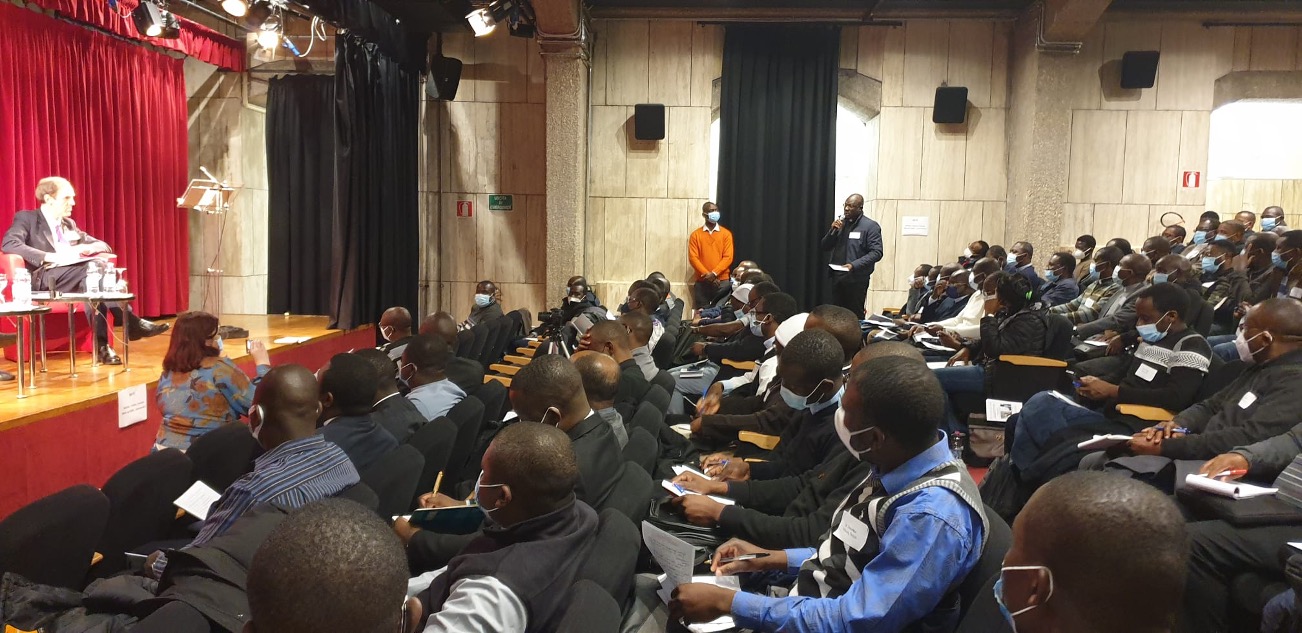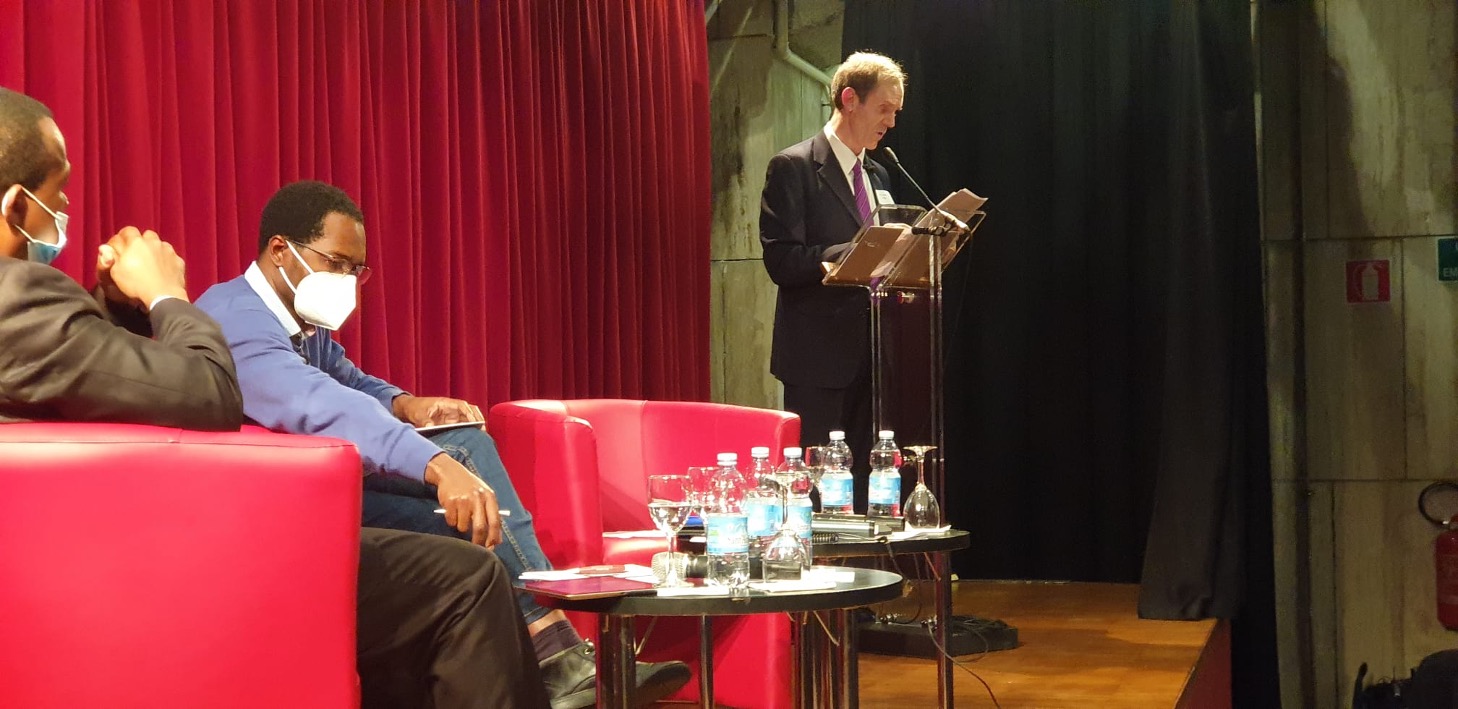Acton Institute just announced the 40 winners of its new Jacques Maritain Fellowship in Rome after launching its first-ever Francophone Africa research project. Decisions on Maritain Fellows were made two weeks after the inaugural Nov. 27 seminar, L’Entreprenariat et l’Età de Droit: Une Introduction (“Entrepreneurship and the Rule of Law: An Introduction”), hosted by Institut Française Centre Saint-Louis, a vibrant Catholic cultural venue founded by Maritain immediately following the atrocities of World War II.
The premiere event, conducted entirely in French, featured Acton’s director of research, Dr. Samuel Gregg, as the keynote speaker. A formal response was delivered by Fr. Antoine Pooda, a Burkina Faso professor of missiology at the Pontifical Urbaniana University and multiyear Acton alumnus. Fr. Serge Remy Ngaba Ebombo, a Cameroonian doctoral candidate in political-economic studies at the Pontifical Gregorian University, served as moderator.

An enthusiastic audience of 140 graduate student priests, nuns, seminarians, and laity joined from every Vatican university and the Sapienza Università di Roma. Following the seminar, 120 very competitive Jacques Maritain Fellowship applications were reviewed and shortlisted. Among the many excellent candidates were ecclesial licence and doctoral degree students in social sciences, philosophy, theology, law, spirituality, family studies, and education. They hailed from 20 different Francophone nations, including Burundi, Cameroon, Democratic Republic of Congo, Haiti, Madagascar, Rwanda, Senegal, and Togo. A few lay religious leaders joined with specialities in civil engineering, health sciences, and business management.
The one-year Francophone project will explore in six private seminars various themes related to the intersection of entrepreneurship and the rule of law in the free market. In addition, attention will be given to producing scholarly publications: two books and 12 articles. Finally, the Jacques Maritain Fellows will participate in “paradigm shift surveys” that aim to track changing student perceptions and attitudes toward key ideas that help economies become more entrepreneurial and just.
In the inaugural French lecture, Dr. Gregg stressed to the packed Saint-Louis Theatre that “the entrepreneur, markets, and the rule of law are habits and institutions which are needed by all people in these nations. … [It ]is especially true in a world that has been dramatically affected by the COVID pandemic, and by the responses of governments” to it. As a consequence, Gregg added, “we have witnessed much suffering across the world. … Entrepreneurs have experienced great difficulty in beginning new businesses or maintaining their existing business in place. Many businesses have closed and will not be reopened.”

This is the “bad news,” Gregg said. Most of all, he noted, “the process of market exchange has been severely disrupted” both domestically and internationally. In some instances, the rule of law has been “compromised and further weakened in countries where it was already very weak or nonexistent.”
However, Gregg noted that “any serious economic recovery will depend on new entrepreneurs entering the market place, as well as a revival of market exchanges.” According to him, this depends not just on great innovation and the freedom of exchange but also on implementing a robust rule-of-law culture: “Without rule of law, free markets becomes black markets. Without rule of law, entrepreneurs will lack confidence that they will keep the profits of their risk-taking and investments of capital.”
“The good news,” Gregg concluded, “is that in times of crisis, it is possible for opportunities to emerge to ask important questions about how we can create new conditions that help encourage the entrepreneur, the development of truly free markets, and the necessary moral and legal foundations for the establishment of the rule of law.”
In his response to Gregg, Fr. Pooda admitted that Africa is experiencing its own particular challenges and dilemmas while seeking to advance an entrepreneurial and just legal culture that is perfectly legitimate according to Catholic social teaching. He said he was neither “Afro-pessimistic nor Afro-optimistic,” but an “Afro-realist.” Pooda went on to say: “In Gregg’s speech, he demonstrated how the ‘trinity’ of entrepreneurship, the market, and the rule of law are interrelated … (and) highlighted the contours of the international order while pointing out the good news and the bad news of this pandemic.”
While quoting the famed Austrian School economist and expert in human anthropology Ludwig von Mises, Pooda said he would like to remind the religious attendees that when addressing problems related to the “indissociable concepts of market, entrepreneurship, and rule of law,” one of the causes of failure is “the lack of satisfaction that pushes people to want to change themselves, to change others, and to change the world in order to live in it and be better.” Based on von Mises’ practical wisdom, Pooda urged the graduate students to ask themselves: “In terms of the market, entrepreneurship, and the rule of law, where do French-speaking (African) countries stand? What is working now and what is not? What is hindering our momentum now and blocking our aspirations?”
During the open discussion, student participants offered many strong opinions. Several called for Africa’s increased self-reliance and innovative use of its wealth of resources and human talent, even as it continued to search for mutually beneficial and “official” networks of exchange within the African continent, such as ECOWAS, the Economic Community of West African States. One Congolese student, seemingly inspired by Pooda’s von Mises citation, lamented that Africa needed to “wake up” and make greater strides with charismatic confidence. He demanded that nations break free from the “death trap” of ignorance and dependence on international aid that “kills” Africa’s economic potential, turning it into a “cadaver” of very weak entrepreneurial initiative.
In the end, the titles of the remaining five private seminars were announced. Among the themes to be explored at the Centre Saint-Louis are: “Education in Entrepreneurship in Francophone Nations”; “Building Rule of Law in Francophone Nations”; “How Entrepreneurship and Rule of Law Help Create True Solidarity”; “Religion, State, and Civil Society: Forming Spheres of Subsidiarity,” and lastly, “Rule of Law in Catholic and Muslim Traditions.”
Stay tuned to this website for further updates to the exciting Francophone Africa research project conducted in Rome.






